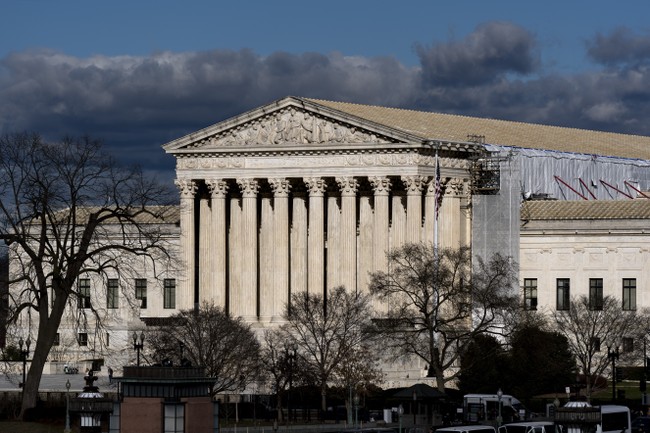Today the Supreme Court heard oral arguments in a case arising out of Colorado. The state passed a law which makes “conversion therapy” by licensed therapists illegal. A Christian therapist sued, claiming that the law infringes on her First Amendment rights. Scotus Blog has a helpful primer on the background of this case.
Colorado passed the law at the center of the dispute, known as the Minor Conversion Therapy Law, in 2019 in response to what it describes as “a growing mental health crisis among Colorado teenagers and mounting evidence that conversion therapy is associated with increased depression, anxiety, suicidal thoughts, and suicide attempts.” The law bars mental health professionals from providing clients under the age of 18 with conversion therapy, although it carves out an exception for anyone “engaged in the practice of religious ministry.”
Chiles, who is a practicing Christian, contends that although she does not try to “convert” her clients, she does try to help them with objectives that may include “seeking to reduce or eliminate unwanted sexual attractions” or becoming more comfortable with their bodies. Chiles filed a lawsuit in Colorado, asking a federal court to block the state from enforcing the conversion therapy ban against her.
A federal trial judge turned down a request for an order that would temporarily bar the state from implementing the ban against Chiles while her lawsuit continued. The U.S. Court of Appeals for the 10th Circuit upheld that ruling. It reasoned that the conversion therapy ban merely regulates conduct – the treatment that Chiles, as a mental health professional, provides – even if it has an “incidental” effect on Chiles’ speech. As a result, the court of appeals concluded, the ban should be reviewed under the least stringent test for constitutional challenges, known as “rational basis” review, and it meets that relatively low bar.
She appealed the outcome to the Supreme Court and they agreed to hear the case in March. Chiles, the therapist, was represented by lawyer James Campbell. Colorado’s solicitor general, Shannon Stevenson, represented the state. The case is considered consequential because there are currently more than 20 states which have laws against such therapy. An adverse ruling by the Supreme Court would impact all of them, not just the law in Colorado.
By all accounts, today’s oral arguments today did not go well for the state. Conservative Justices appeared sympathetic to Chiles’ claims and likely to rule in her favor.
During a surprisingly low-key and short 90-minute session, several justices appeared to reject the idea the state can regulate “talk therapy” the same way it may regulate medical conduct. Much of the debate seemed to focus on how Colorado would lose, rather than whether it would do so.
Chief Justice John Roberts pointed to prior Supreme Court decisions in which the court declined to carve out a different First Amendment approach to professional speech. It was a theme several of the court’s conservatives returned to repeatedly.
“Just because they’re engaged in conduct doesn’t mean that their words aren’t protected,” Roberts said.
If the state has lost CJ Roberts then they are in trouble. Even Justice Kagan seemed skeptical.
“It’s like blatant viewpoint discrimination,” Justice Samuel A. Alito Jr. said of the law.
Most of the court’s conservative justices expressed doubts that the law could avoid colliding with the free speech rights of therapists. So, too, did Justice Elena Kagan, who echoed Alito’s concern about discriminating among different views, which the First Amendment generally prohibits the government from doing.
Only Justice Jackson seemed convinced by the state’s arguments.
The court’s liberal justices asked more probing questions of Chiles’ lawyer but, of the three, only Justice Ketanji Brown Jackson seemed to fully embrace the state’s arguments in favor of the ban.
She brought up the Supreme Court’s ruling earlier this year when it held that states could ban gender transition care for minors, in a case involving a Tennessee law. She questioned why the court would give states deference in one scenario but not the other.
Much of the discussion was focused on the difference between talk therapy and adverse therapy.
Colorado and other states have pointed to research showing that the practice doesn’t work and can be harmful. Some of that research shows it increases a person’s risk of suicide and can cause other long-term health problems, such as depression, anxiety and high blood pressure. Children who undergo conversion therapy are more than twice as likely to run away.
But Alliance Defending Freedom, a religious law group, has argued those studies conflate “aversive” forms of therapy with the kind of “talk therapy” their client, Chiles, wants to engage with. It’s a point Chiles’ attorney James Campbell included in his opening and closing statement.
“Colorado can’t prove harm because it hasn’t cited a study focusing on what’s at issue here – voluntary speech between a licensed professional and a minor,” Campbell told the justices.
It was a point that several justices appeared to zero in on.
As I said, the uniform consensus is that this law is going to be overturned one way or another. At a minimum, the Supreme Court could send this back to the lower court for a new decision, but it seems more likely they will just overturn it on First Amendment grounds. If so, all similar laws in other states will also be struck down.
Paul Sherman, a senior attorney at the Institute for Justice, live-tweeted the oral arguments and is convinced the law will be overturned.
TLDR: Colorado is cooked. I predict the law is struck down 7-2. The Chief writes. Gorsuch may write separately to address his assisted suicide argument (Alito joins). Kagan concurs, arguing that the court should just decide on viewpoint grounds. Jackson/Sotomayor dissent. https://t.co/HWPqgTqySg
— Paul Sherman (@PaulMSherman) October 7, 2025
And if I’m wrong, I’m underestimating the votes Chiles will get. Could conceivably be 8-1 or 9-0, though on fractured grounds.
— Paul Sherman (@PaulMSherman) October 7, 2025
Editor’s Note: The Schumer Shutdown is here. Rather than put the American people first, Chuck Schumer and the radical Democrats forced a government shutdown for healthcare for illegals. They own this.
Help us continue to report the truth about the Schumer Shutdown. Use promo code POTUS47 to get 74% off your VIP membership.
Read the full article here











